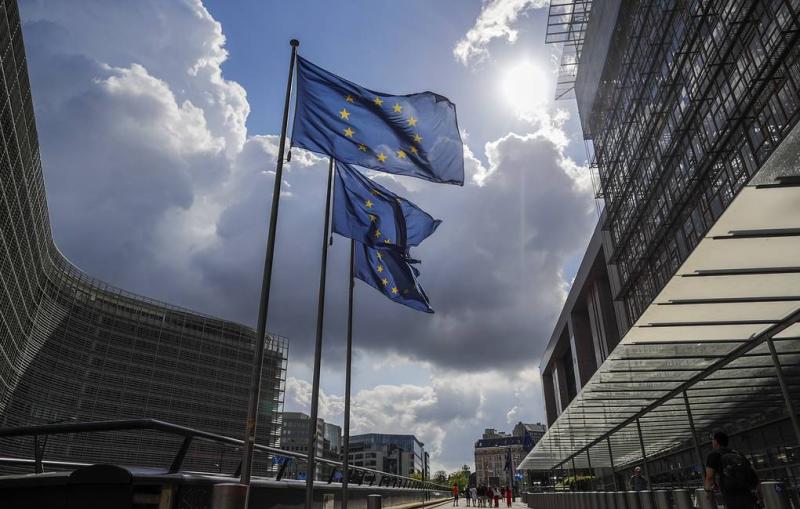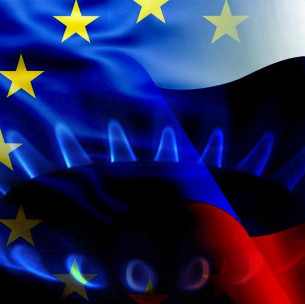
© EPA-EFE/OLIVIER HOSLET/TASS
Top stories from the Russian press on Wednesday, January 11th, prepared by TASS
Western countries are searching for ways to seize frozen Russian assets, Armenia is concerned about the role of the Russian peacekeeping forces, and Kiev asks for help with heavy tanks. These stories topped Wednesday’s newspaper headlines across Russia.
Nezavisimaya Gazeta: EU, US seek to confiscate Russian assets
Following the Christmas holiday, the West doubled down on its sanctions against Russia. According to EU officials, a new, tenth package of EU penalties will be focused on closing "loopholes" used to avoid or lessen the impact of the previously enacted restrictions. The new sanctions will target Belarus and Iran. Furthermore, EU and US leaders are increasingly being pressed to make decisions on the fate of the frozen Russian assets. A number of EU countries have demanded that the funds be confiscated and transferred to Ukraine as soon as possible, Nezavisimaya Gazeta writes.
The preparation of the tenth package of EU sanctions against Russia has not yet been publicly acknowledged, but it is not a particular secret. Ukraine's Prime Minister Denis Shmygal expressed Kiev’s views during a meeting with European Commission Vice President Frans Timmermans on Monday. He believes the tenth package should include sanctions against Russia's nuclear industry. Western countries also intend to better coordinate their efforts in confronting Russia on all possible fronts.
The European Commission is now drafting a common EU agreement on what to do with the frozen funds of Russian individuals and legal entities. There is no indication of when it will be ready. However, according to Mihkel Tamm, Estonian Foreign Ministry spokesman, a plan for the confiscation of Russian assets will be hammered out by the Baltic country by the end of January.
Seizing state's assets will create a very difficult legal scenario, not to mention the fact that the confrontation with the Kremlin will become even more difficult, Nezavisimaya Gazeta writes.
Kommersant: Armenia 'concerned' about role of Russian peacekeepers
Armenian Prime Minister Nikol Pashinyan on Tuesday made very harsh statements regarding the role of Moscow and the Collective Security Treaty Organization (CSTO) in the Karabakh settlement. Nevertheless, he stressed that these words should be considered "not criticism, but an expression of concern." He refused to conduct CSTO exercises in Armenia in 2023, and also made it clear that in the future it might be better to replace Russian peacekeepers with an international mission, Kommersant writes.
Pashinyan recalled that the Russian peacekeeping contingent should ensure the functioning of the Lachin Corridor linking Armenia with Nagorno-Karabakh. But this strategically important road has been blockaded since December 12, 2022.
Kommersant’s Karabakh sources describe the situation as difficult, primarily psychologically, but not critical from the point of view of survival.
Pashinyan said if Russia is unable to fulfill its obligations, it should contact the UN Security Council to either grant the Russian military contingent an international mandate, or send a new multinational peacekeeping mission to Nagorno-Karabakh. Yerevan does not want to apply to the UN on its own, which could mean it is also petitioning against Russia, Pashinyan explained.
The Armenian leader refused to conduct CSTO exercises in the country in 2023. Kremlin Spokesman Dmitry Peskov in turn said that the organization "will clarify the details of Armenia's position."
On Tuesday, Azerbaijan's President Ilham Aliyev also spoke with journalists from the country's main television networks. Unlike Nikol Pashinyan, his speech exuded optimism for the future.
Nezavisimaya Gazeta: NATO forms 'tank alliance' in support of Ukraine
Russia's recent tactical gains during the special operation in Ukraine are being bitterly felt in the West, which is evident from the joint statement signed by NATO and European Union leaders on January 10 in Brussels, Nezavisimaya Gazeta writes. NATO Secretary General Jens Stoltenberg, European Commission President Ursula von der Leyen, and EU Council President Charles Michel in a joint document told the global community that they were bringing the partnership "to a new level". Stoltenberg said that this means the bloc would expand at the expense of Sweden and Finland and noted the possibility of supplies of NATO’s most advanced high-precision weaponry to Kiev, including heavy tanks.
Stoltenberg did not rule out sending Leopard and Abrams tanks to Kiev. However, the Biden administration earlier refused to supply Ukraine with Abrams tanks. "The current US reluctance to supply Abrams to Ukraine is largely due not only to material reasons (these are the most expensive tanks in the world) or exclusivity but also to Washington's desire to use European NATO countries for Kiev’s massive military supply," military expert Lieutenant General Yuri Netkachev said.
Commander-in-Chief of the Armed Forces of Ukraine Valery Zaluzhny told the Economist magazine that he needed at least 300 tanks. "But whether NATO and EU countries will provide this many armored vehicles to Kiev is up in the air," Netkachev added.
"All matters related to the transfer of tanks to Kiev are decided by politicians. Unfortunately, the trend is such that if Russia continues to succeed in the special operation, the level of NATO combat aid may expand," Shamil Gareev, a retired colonel, told the newspaper. He noted, "tanks, field artillery, and multiple launch rocket systems will play a significant role in coordinating Ukraine's anticipated spring attack."
Izvestia: Japanese PM embarks on G7 tour
Tokyo is confident in deepening security cooperation with the US and other G7 countries. This week, Japanese Prime Minister Fumio Kishida visited G7 countries to touch base ahead of the group's May summit and to strengthen defense ties with key Western powers in order to face up to North Korea and, to a lesser extent, China. That said, Tokyo is not only looking for allies. Late last year, the Kishida administration authorized a plan to double the defense budget and granted the military free rein to conduct pre-emptive strikes against presumed adversaries, Izvestia writes.
The trip is connected with Kishida's recent policy change, aimed at increasing defense spending and getting opportunities to strike an enemy, as well as strengthening Japan's alliance with the US, taking into account a possible crisis around Taiwan, Koichi Nakano, a professor of political science at Sophia University, told the newspaper.
Japan's increased role in international security, as reflected by the prime minister's current trip, will certainly boost Kishida's own rating within the country. Kishida seeks to garner greater support from the Japanese public. He also is pursuing US acceptance by showing how useful and loyal he can be to a bilateral alliance, the expert added.
However, according to the professor, this strategy has one flaw - no one knows how to pay for it. According to calculations, Kishida’s new defense plan will require an additional $30 bln a year once the money from other reserves runs out.
Vedomosti: Russia reports $47 bln budget deficit for 2022 amid economic uncertainty
The Russian government has summarized the preliminary federal budget figures for 2022: revenues totaled over 28 trillion rubles ($401 bln), while expenses reached more than 31 trillion rubles ($473.04 bln), Prime Minister Mikhail Mishustin announced at a government meeting on Tuesday. Finance Minister Anton Siluanov emphasized that the budget was implemented with a deficit of 3.3 trillion rubles ($47.3 bln), or 2.3% of GDP, Vedomosti writes.
The minister noted that the initial income plan last year was surpassed by 2.8 trillion rubles ($40 bln). Budget expenditures in 2022 also increased, Siluanov added. According to him, the funds were primarily used to support people and social programs.
The steep increase in spending - and, as a result, the budget deficit - is a political choice to postpone some of the spending in 2023 to the end of 2022, Anton Tabakh, chief economist at Expert RA, said. This could help improve the prospects for the first half of this year in terms of spending, he said.
Overall, the budget deficit in 2022 of 3.3 trillion rubles fits expectations, Sovcombank's chief analyst Mikhail Vasilyev told the newspaper. This indicator was formed as a result of a considerable increase in government spending due to the Russian economy's large-scale restructuring in the face of confrontation with the West and the unprecedented sanctions pressure, he explained.
Given its low level of public debt, Russia may be able to maintain macroeconomic stability for several years with a budget deficit of 2-3% of GDP, according to PSB bank's chief analyst Denis Popov.









